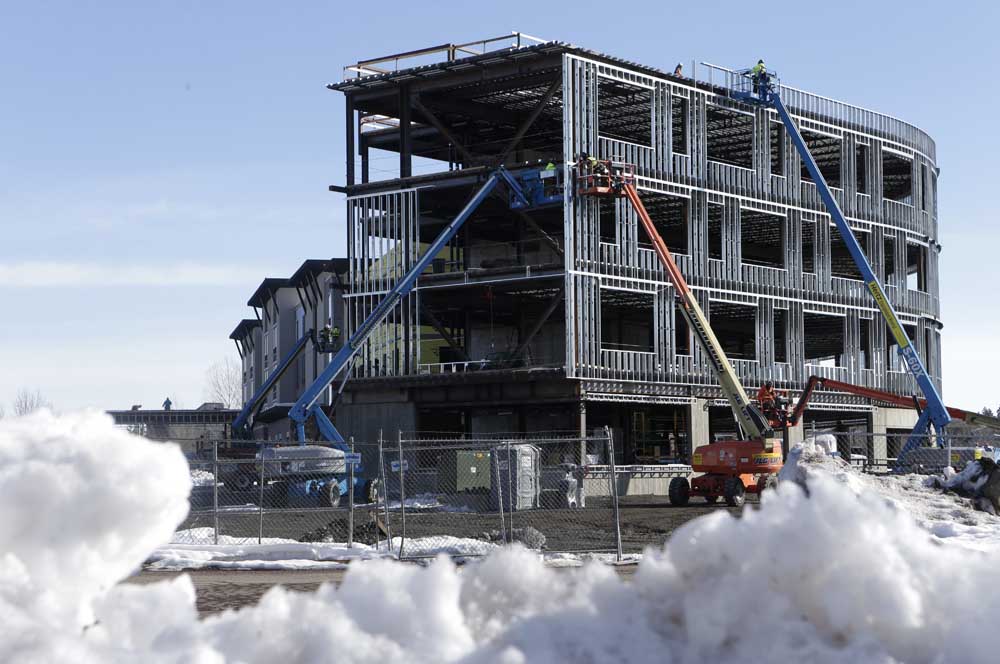Historic winter puts construction work in a hole
Published 11:56 pm Sunday, January 29, 2017

- Construction continues on the Crane Shed Commons building in the Old Mill District.(Joe Kline/Bulletin photo)
The record snowfall in Central Oregon has made life difficult for almost everyone, and it’s had an expensive impact on one of Central Oregon’s most important industries.
Once the snows and hard freezes began in early December, the region’s construction work slowed to a near halt across Central Oregon. Consequently, builders are over their budgets, behind their schedules and close to laying off workers.
Trending
“We haven’t run into this in Bend before,” said Jay Nees, project manager with Walsh Construction Co., a commercial builder based in Portland.
Walsh Construction broke ground on Range Apartments, a six-building apartment project in NorthWest Crossing, over the summer. Nees said the apartments would come onto the market in phases. The first buildings are still slated to open in late spring. But Nees said some of the buildings that broke ground later in the process are one to two months behind schedule.
Between finding materials that work in low temperatures and keeping work sites safe and clear of snow, ice and other winter hazards, Nees estimated that the cost of winter weather on the apartment project has exceeded $100,000.
“I think everyone’s over budget at this point,” Nees said.
Nees is far from alone. While estimates vary, many buildings in Central Oregon — from single-family homes to large commercial projects — are running between one and three months behind schedule.
Erich Schultz, co-founder and principal broker at Compass Commercial Real Estate Services, said he expects Crane Shed Commons, a 50,000-square-foot office building rising on SW Industrial Way, to be completed in July, rather than June as was initially predicted.
Trending
“(The weather) probably set us back about 30 days,” Schultz said.
Despite that, Dan Hopper, project manager for Kirby Nagelhout Construction Co., the general contractor on the Crane Shed Commons project, said he has brought in additional equipment and staff, and expects the project to be completed by the end of June.
Of course, winter in Central Oregon almost always means dealing with some amount of snow and ice. Brian Fratzke, founder and principal broker at Fratzke Commercial Real Estate, said one adjustment for builders who come to Bend from warmer climates is dealing with a more limited building season. He said many local asphalt plants close for the winter, meaning that driveways and parking lots can be difficult to complete between November and March.
“You don’t have a 12-month construction season; you just don’t,” Fratzke said.
Still, this winter has been exceptional. Tim Knopp, executive vice president of Central Oregon Builders Association, a nonprofit for the construction industry, said builders can often continue working on commercial and residential projects through the heart of winter, taking a day or two off as needed. This winter, however, the combination of heavy snows and sustained low temperatures have made it more of a challenge.
“It seems like every 10 to 15 years you get something like this (winter),” Knopp said. “I guess this is our year.”
Following a heavy snowfall, Knopp said construction crews have to shift gears, using gear intended for heavy construction for snow removal just to make the site usable. Nees added that Walsh has resorted to drastic measures — including renting a 120-by-50-foot wedding tent — to keep the foundation of an apartment building warm and without snow.
Even more troublesome in certain cases are consistent hard freezes. Gary North, vice president of Bend-based R&H Construction, said freezes make it a challenge to lay and maintain concrete foundations of buildings.
North added that the company has resorted to renting equipment that can heat the ground at work sites, which can be prohibitively expensive. Consequently, he said, a mixed-use development at the corner of NW Galveston Avenue and NW Federal Street, one of R&H’s nine active projects in Central Oregon, is five to six weeks behind schedule.
“Once the ground’s frozen, you can’t do much with it,” North said.
Finally, Nees said a variety of building materials, from asphalt to spray-foam insulation, don’t work properly once the temperature drops below a certain threshold.
“The cold shuts down a lot of things,” he said.
While it’s too early to know the impact on Central Oregon’s economy, the harsh winter could lead to layoffs in the region’s resurgent construction industry.
The industry was among the Deschutes County’s fastest-growing over the last couple of years. It added 980 jobs in Deschutes County between December 2014 and December 2016, a 20 percent increase.
Even during normal weather patterns, winter is a period of job loss for Deschutes County’s construction workers. Damon Runberg, Central Oregon economist for the Oregon Employment Department, wrote in an email that the construction industry in Deschutes County historically sheds 6.8 percent of its jobs between December and January. He added that the figure varies dramatically from winter to winter, however, and has stood at 2.5 percent over the previous three winters.
“I would presume that we will see a greater monthly drop than 2.5 percent when the January numbers are released due to the historic snow depth,” Runberg wrote.
North confirmed that R&H Construction was “close” to weather-related layoffs for the company’s staff of approximately 30 employees.
Fratzke added that the delays could create a backlog of work once the weather improves, keeping builders busy and preventing them from breaking ground on additional projects slated for later in the year. In a market that is running low on available industrial and commercial space, such a backlog could create problems.
Knopp said it’s too early to know exactly how significant those delays will be. If the heavy snows are done for the year in Central Oregon, he said most builders will be caught up on their work by the middle of summer. However, additional delays could mean that builders will be working through their backlog until next winter begins.
“This is pretty exceptional,” Knopp said.
— Reporter: 541-617-7818,
shamway@bendbulletin.com
I think everyone’s over budget at this point.— Jay Nees, project manager with Walsh Construction Co.








